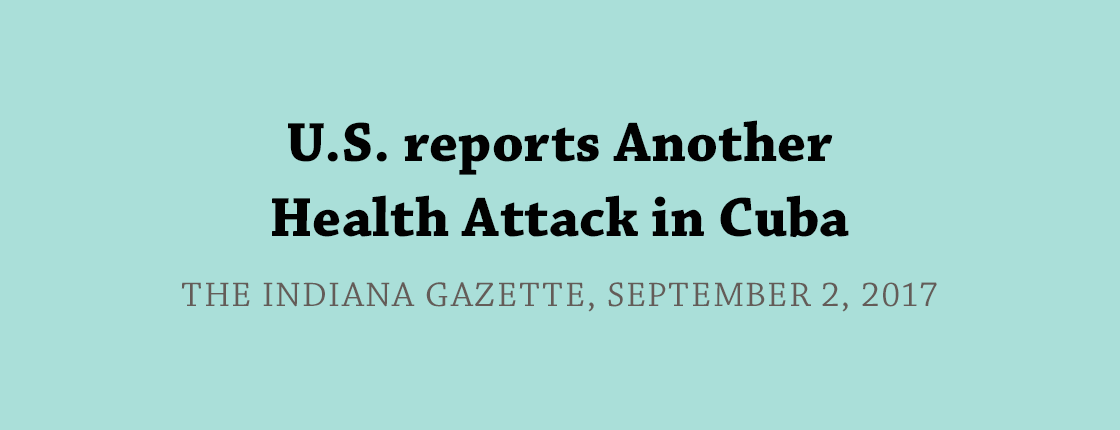It was a great story that has captivated global attention for the past 6 years with claims of secret ray guns firing mysterious energy beams. There was only one problem – it wasn’t true.
On March 1, 2023, the U.S. Government released the findings of a new report on ‘Havana Syndrome’ – a mysterious condition that has affected American diplomats and intelligence officers in Cuba and later around the world since 2016.1 Five different intelligence agencies have deemed it “highly unlikely” that the condition was the result of a foreign adversary or that a directed energy weapon was involved in causing “anomalous health incidents.” The report would have left many in the intelligence community and Congress red-faced given that since its existence was first announced in August 2017, the government has spent tens of millions of dollars to track down the supposed culprits. Last year, Congress even approved millions of dollars in compensation for victims! On October 8, 2021, President Biden signed into law the HAVANA Act or ‘Helping American Victims Afflicted by Neurological Attacks,’ so named because the first attacks reportedly took place in Cuba. Victims from the CIA and State Department were authorized to receive initial payments of as much as $187,300 for those assessed to have been stricken with the condition.2
In addressing their findings, intelligence officials only released a summary of the report and were careful to point out that that they were not doubting the health claims made by victims. They also conspicuously failed to mention the ‘P’ word – the possibility that some of those affected could have been suffering from psychosomatic ailments. However, a CIA assessment earlier this year found that most of the reported health complaints were the result of existing conditions, environmental factors, and “anxiety,” but fell short of specifically mentioning mass psychogenic illness.
At the height of the Havana Syndrome panic, one theory held that it could have been the unintended consequence of a surveillance device which emitted an energy beam that made people sick, but that possibility was dismissed by an official familiar with the full report.3
This case is a classic example of what can happen when science is intertwined with politics. These complex entities can be separated, but it takes time. While the wheels of progress turn slowly, in this instance the delay in getting to the bottom of Havana Syndrome took far too long. The result was a waste of valuable time and resources, tens of millions of dollars, unnecessary anxiety, damage to the Cuban economy, damage to the credibility of the American intelligence community and the news media, and a stoking of international tensions.
The case of Havana Syndrome is a study in media sensationalism, faulty science, and poor government. By 2018, both the FBI and a panel of top scientists (the Jason group) had both concluded it was highly unlikely ‘Havana Syndrome’ was caused by microwave or sonic weapons, and that anxiety played a major role. The FBI and Jason reports were kept confidential. It was only in 2021 that the conclusions of the FBI report were leaked, while the Jason findings came out in September of the same year as a result of a Freedom of Information Act request.
While perceived victims and lawyers are continuing to cry foul, there can be little doubt that this new report almost certainly sounds the death knell for ‘Havana Syndrome.’ That this imaginary condition survived for so long on the public consciousness is a testament to the ignoring of many red flags that led the public astray down a long rabbit hole. And in the end when they had thoroughly searched that hole, they failed to find Bigfoot or a chupacabra – they found a rabbit. ![]()
About the Author
Robert E. Bartholomew is an Honorary Senior Lecturer in the Department of Psychological Medicine at the University of Auckland in New Zealand. He has written numerous books on the margins of science covering UFOs, haunted houses, Bigfoot, lake monsters—all from a perspective of mainstream science. He has lived with the Malay people in Malaysia, and Aborigines in Central Australia. He is the co-author of two seminal books: Outbreak! The Encyclopedia of Extraordinary Social Behavior with Hilary Evans, and Havana Syndrome with Robert Baloh.
References
- Unclassified: National Intelligence Council Updated Assessment on Anomalous Health Incidents, March 1, 2023 (ICA 2023-02286-B).
- “Implementation of HAVANA Act of 2021,” Department of State, 22 CFR, pt. 135, Federal Register 87, no. 125, June 30, 2022, 38981, available at https://www.federalregister.gov/documents/2022/06/30/2022-13887/implementation-of-havana-act-of-2021.
- Faguy, Ana (2023). “‘Havana Syndrome’ Likely Wasn’t Caused by Foreign Adversary, Intelligence Report Finds.” Forbes, March 1.
This article was published on March 13, 2023.















